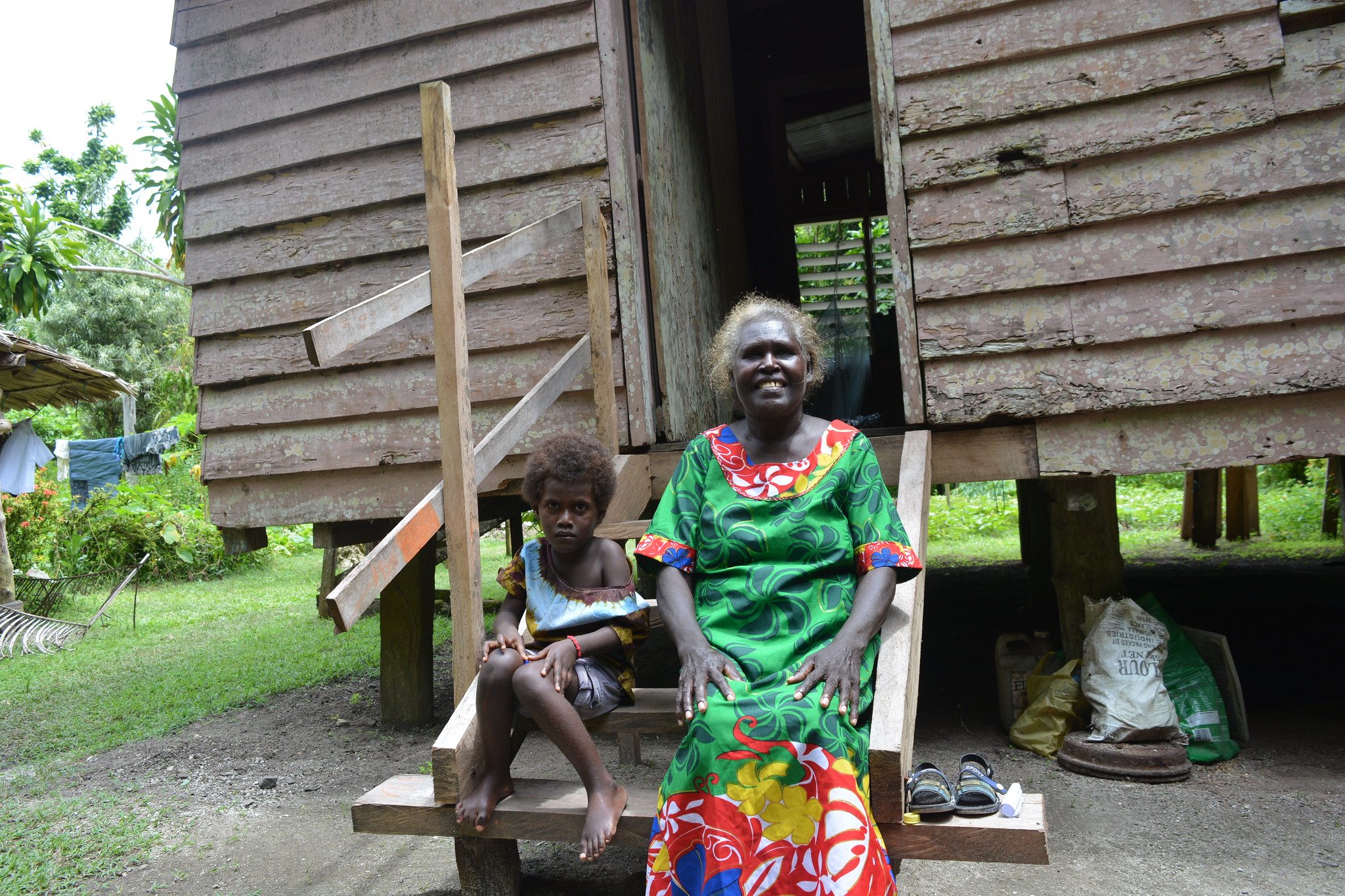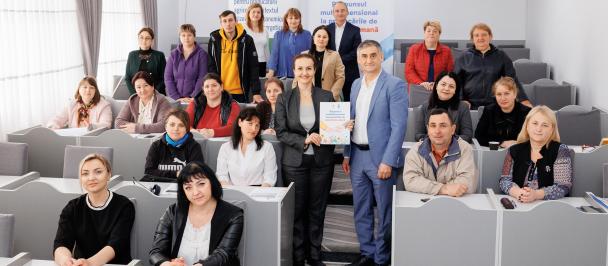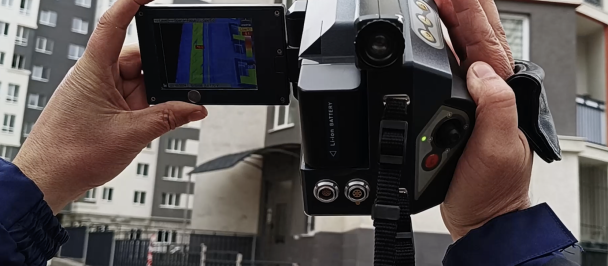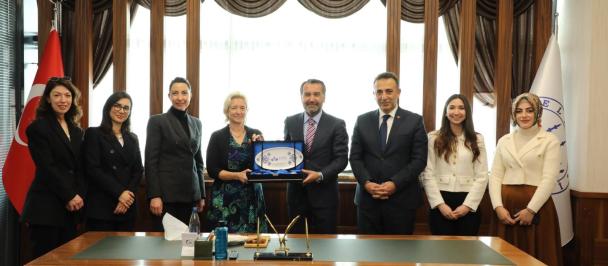Marian starts her organic garden for healthy living
November 1, 2023

Marian Biu with her five-year-old granddaughter.
Gizo, Solomon Islands – Marian Biu lives by the values that she is not limited by her circumstances. At the age of 60 and a widow, Marian has health issues and lives with a disability. She is raising her five-year-old granddaughter, little Marian Lusey, in her wooden home in Gizo located in the Western Province of Solomon Islands.
She is known by her friends and families as a strong and hard-working woman. Inspired by her perseverance, Founder and Coordinator of the Gizo Women in Business Development Incorporation (GWIBDI), Esther Suti, signed her up for organic farming training under the Enhancing Food Production through Agroforestry Project.
“I was visiting her brother to join the training when I met her. I thought she wouldn’t be able to do any work because of her disability but she told me she doesn’t need anything but just a knife and a hoe. Through the project, she learned the trade of organic farming and has worked on her garden every day since. She was given a gardening hoe and a knife to start her garden and she has proven that she is not limited by her disability,” she said.
Assumptions that programmes make gendered roles in agriculture and about what people living with disabilities need can often lead to the exclusion of women or people living with disabilities before they have had a chance to voice their needs. It is critical that programme design happens in partnership with diverse groups, including those living with disabilities, to address this. Marian, who previously had only lemons in her garden, now has much more variety of organic produce that she sells and earns a living; she even has more than she needs after her sales, which she shares with extended members of her family who are without food.
Marian Biu said, “I only sell lemons from my garden, but I had no tools to work the garden. Now with the hoe and knife, I clean up, I plant, I harvest, and I sell. In my gardens, I now have potato, cassava, lemons, pumpkin, cabbage, banana, pawpaw, guava. This training is very good. It is helping me and my health. I have not only benefitted, but I have also enjoyed the tools that have been provided.”
Marian, who is also diabetic, added that with organic farming she has access to healthier food from her garden. The vegetables she has grown have been beneficial for her condition and her granddaughter’s health. With vegetable seeds she’s received, she has also learned to build and care for her nursery.
“I’m happy because Esther follows up and checks on me and how I’m doing. I don’t sit down and wait for someone to provide for me –with the help given to me I can do it, cutting the grass and planting with what I learned from the training,” said Marian.
Esther, through GWIBDI, helps many Gizo women like Marian to be independent and to have access to support and use the resources around them. Training such as that in organic farming help women use natural manure for gardens, these are cheaper than fertilizers and contribute to healthier living.
GWIBDI has about 1,000 members, five of whom are persons living with disabilities, who have been supported through the agroforestry initiative to start their own businesses. People living with disabilities are not required to pay registration fees with GWIBDI. Ongoing support provided by Esther and GWIBDI is critical in ensuring women receive the advice and information they need to support business growth.
A risk Marian faces now with her farm concerns stray animals, such as pigs and chickens, who wander into her gardens and destroy her produce when she’s away. She plans to build a fence around her garden to manage these risks.
“The risk of stray animals started this year, and this is unusual for Gizo. These are not wild animals but ones that escape from their owners. And can be managed by talking to the owners,” said Esther.
Another risk is the use of fertilizer that it is not only expensive but damages the soil. The use of chemical fertilizers is not aligned with Esther’s vision for GWIBDI that promotes healthy living. Esther recalls “It was challenging for us to promote organic farming to women because it was a new idea to them, it took time, but their mindset has changed when we showed them how to do composting and how cheap it is. Organic farming is environmentally friendly and protects the soil.”
She added that due to climate-related disasters, the training encouraged women to plant crops and vegetables that are resilient to these conditions; vegetables such as sour cabbage and plants that produce many seeds when ripe. This will manage the need to buy more seeds and allowing the women to have them stocked during hard times. In the past, farmers have lost certain breeds of crops due to climate disasters and they hope that through organic farming the women can plant and continue to preserve their local crops.
The UN Development Programme (UNDP) through its Governance for Resilient Development in the Pacific (Gov4Res) Small Grants Initiative (SGI) channels finance to organisations, such as GWIBDI, who understand how best to support their members, identify the risks they face and ensure that solutions to risk-informing development are locally led and driven.
UNDP Risk Informed Development Specialist with Gov4Res Project, Lisa Buggy, said, “The primary purpose of the Small Grants Initiative is to fund community development projects that have a high development impact and are aligned to government priorities. A critical component is to support organizations such as GWIBDI to integrate risks in the design, implementation, and budget of their projects. This ensures that climate change and disaster risks are addressed, and projects have gender and social inclusion considerations at their core.”
The GWIBDI Enhancing Food Production through Agroforestry Project is one of 11 community development projects being supported through the Gov4Res SGI in Solomon Islands. The initiative provides technical support and grants of up to US$30,000 to Pacific-based non-governmental organisations, civil society organizations and community-based organizations.
The UNDP Gov4Res project is implemented with funding support from the Governments of Australia, New Zealand, Korea, Sweden, and the United Kingdom.

 Locations
Locations






